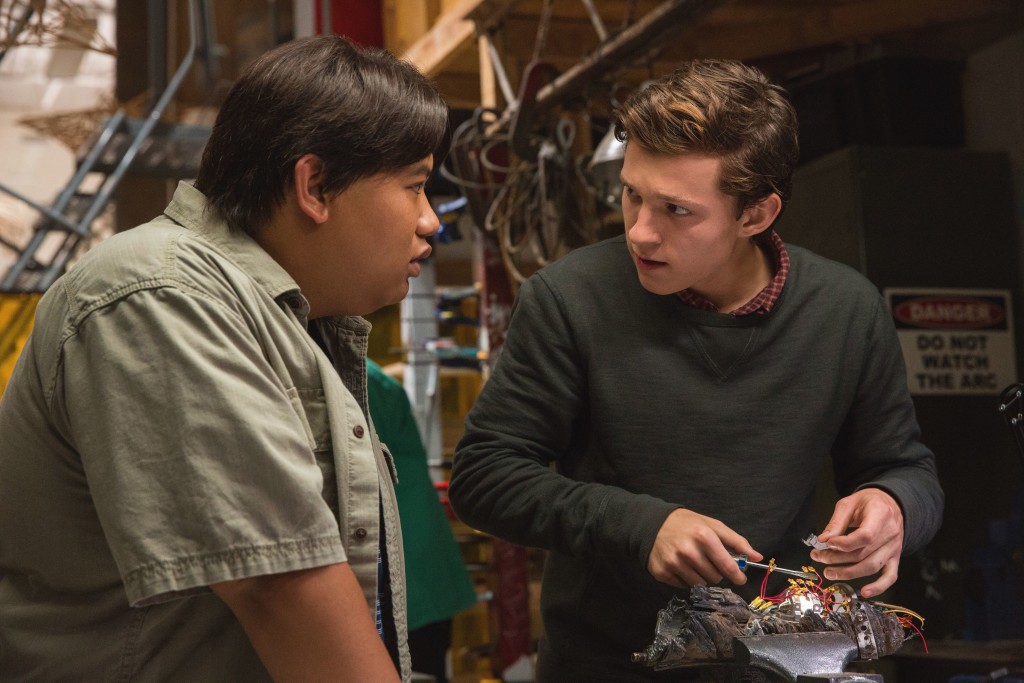Genre: Super-Hero
Premise: After Peter Parker, aka “Spider-Man,” comes down from the high of fighting with the Avengers, he must figure out how to live life as a normal teenage kid again.
About: When the last Spider-Man actor, Andrew Garfield, pissed off Sony brass by ignoring some of his business duties, the studio decided to nix a third film and reboot the series. Of course, it wasn’t a tough decision. Both The Amazing Spider-Man and its sequel underwhelmed audiences. Sony then took a gamble on Jon Watts, whose tiny film, “Cop Car” proved Watts’ ability to pull believable performances out of young actors. The gamble paid off as Spider-Man pulled in 117 million dollars this weekend, 20 more than everyone expected. Maybe the biggest surprise of them all, however, was who wrote the script – Jonathan Goldstein and John Francis Daley. The team is known for underwhelming flicks such as Vacation and Burt Wonderstone. Well, their stock just went way up. They’re going to be at the top of everyone’s tentpole list moving forward.
Writers: Jonathan Goldsten & John Francis Daley and Jon Watts & Christopher Ford and Chris McKenna & Erik Sommers (as you can see, a ton of writers are credited. But Goldstein and Daley seem to be the ones hitting the promotional circuit so I’m guessing they had the most influence on the script)
Details: 133 minutes
A lot of people (and by a lot of people I mean me) have been asking the question – Why is it that THIS Spider-Man did so much better than the last reboot? For those who have forgotten, The Amazing Spider-Man cleared barely 60 million at the bank in its first weekend. And its successor made 90 million. So how did this Spider-Man make 115 million?
The answer is two-fold, and the first part is that Sony put more stock in its relationship with emerging stars Emma Stone and Andrew Garfield than they did finding the best cast possible. Garfield and Stone were moving up the Sony ranks, starring in a lot of the studio’s films, and in order to keep them around, they said, “Hey, here’s Spider-Man,” despite the fact that Andrew Garfield was the worst choice for the webslinger possible. Well, maybe better than Channing Tatum. But not by much.
By bringing in a fresh face for Spider-Man: Homecoming, it conveyed to the ticket buyers, we’re not being lazy anymore. We actually tried on this one. And that matters. Some people don’t think it matters but it does. A new face brings an excitement to the role that comes off in the actor’s performance and his promotional duties. The general public feels that excitement and wants to be a part of it.
The second is that Sony finally stopped being greedy and hogging Spider-Man to themselves, making the unprecedented move to share Spider-Man with the Marvel Cinema Universe. Now as we all know, this decision wasn’t made in a vacuum. Sony was falling apart, the studio bleeding money with bomb after bomb. They had to do SOMETHING to shake things up, and by lending Spider-Man to Disney, they essentially created a giant commercial for their own franchise. Also, it doesn’t hurt your popularity when you’re all of a sudden seen with all the cool kids.
But what about the movie, you say?
Peter Parker has just got back from that kick-ass ass-kicking of the Avengers at that European airport and he WANTS TO DO MORE! But Tony Stark tells him, “Don’t call us. We’ll call you.” Which means poor little Peter Parker has to go back to school and be a normal kid.
Peter and fellow nerd, Ned, skip parties in lieu of putting together 4000-piece lego sets of the Death Star, dreaming of the day ladies start noticing they exist. Luckily, Peter’s female situation isn’t hopeless. He’s got a mega-crush on his debate team teammate, Liz. And even though she’s like, so popular ohmygod, she throws a bit of flirt down whenever they chat.
Meanwhile, Peter spends his evenings fighting crime in the Tony Stark-enhanced spider-suit he got for being an Avenger (complete with a talking female voice). And it’s during these late night escapades where he runs into… the Vulture! The Vulture is a contractor named Adrian Toomes who got a brief job on the Stark Building cleanup, allowing him to secure some alien scraps.
He then used those scraps to build an underground weapons business and, oh yeah, a cool ass suit that lets him fly around and scrap more effectively. Vulture sees Spider-Man as a minor nuisance, too green of a super-hero to truly upset his business. But Peter Parker is nothing if not determined. He’ll ditch homecoming AND his crush if it means saving New York City from scum like this guy.
A lot of people think big-budget screenwriting is about cool shit. Neat set-pieces. Sick weapons. End-of-the-universe stakes. That’s not where screenwriters make their money. Screenwriters make their money on their story and character choices. And there’s a huge one in Spiderman: Homecoming that displays this in full glory.
(spoiler) In the third act, Peter goes to pick up his date, Liz, for Homecoming. And guess who answers the door? Adrian Loomes. Vulture. It turns out that all this time, Adrian was Liz’s dad. At this point, Peter knows who Adrian is, as he’s seen him without his mask on. But Adrian hasn’t seen Spider-Man with his mask off yet.
What we get next is the best 10 minutes of the movie. And guess what? There are no “neat set-pieces.” There isn’t a single “sick weapon.” The fate of the universe is not at stake. We have Peter in Adrian’s kitchen as he waits for Liz to get ready, and the two just talking. Long-time Scriptshadow readers know this as dramatic irony, an extremely powerful storytelling tool.
Then Adrian drives the two to Homecoming. This scene plays out a little differently from the last because Liz is in the car now. So there are three people instead of two, upping the subtext to a new level (is Liz going to pick up on what’s going on?). Adrian is sure he recognizes Peter’s voice, but he can’t figure out where from. So the whole car ride is driven by the question: Will Adrian figure out Peter is Spider-Man?
The reason I say “This is screenwriting” is because we’re engaged purely by the characters and the situation. Nobody gets to hide behind cool suits that spit out spider-drones. But what’s really great is the twist that started this whole sequence. It was a twist THAT WAS PERSONAL. The girl he’s infatuated with is the daughter of the man he’s trying to kill! That’s so much better than, say, if Adrian turned out to be the Mayor. That twist wouldn’t be personal at all. It’s just a twist for a twist’s sake.
Speaking of the Vulture, I was trying to figure out why he was working so much better than the recent stretch of villains I’ve seen onscreen. At first I thought it was Michael Keaton. But after awhile I became convinced it was in the writing. It was an interview with director Jon Watts that cleared it up for me.
He said when he thought about this villain – the vulture – he asked, “What do vultures do?” They scavenge. So he got this idea that the Vulture would scavenge these bits and pieces of technology from the leftover battles of the Marvel Universe. How awesome is that? That you would use the essence of a character to determine how he becomes what he is? Writers don’t do this anymore. They don’t think about their villains. They just make them assholes who abuse their superpowers.
The movie wasn’t perfect though. They could’ve come up with more inventive set pieces. I mean, didn’t Batman retire the whole ferry boat thing from the set-piece idea book? And they didn’t spend enough time in high school. I can’t believe I’m saying that. But the high school angle was the one area that felt unique to a super-hero movie, and we really only spend a few minutes in science class there, one scene at the gym, and that’s it. They probably could’ve done away with one of the action sequences so we could spend 10 more minutes in school and strengthened the love story while they were at it.
But Spider-Man: Homecoming does more right than it does wrong, and is a lot better than the last iteration of the franchise by a web-slinging mile.
[ ] What the hell did I just watch?
[ ] wasn’t for me
[x] worth the price of admission
[ ] impressive
[ ] genius
What I learned: When you write in a twist, you get bonus points if it has personal stakes attached to it. The twist here of Vulture being Liz’s dad works well because it affects Peter personally. A garden variety twist (The Vulture is Tony Stark’s step-brother!) would not have achieved that. A twist should never only work for 1 second (the moment of the surprise). It should have lasting implications that affect your character for many scenes to come.




